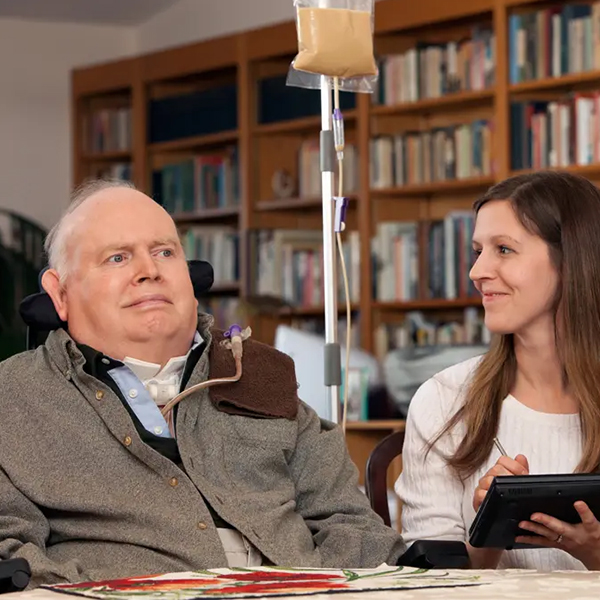SELF-FUNDING HOME CARE
When planning long-term care and support for a loved one, it is sensible to start thinking about financing the care they need as soon as it is practically possible.
At Prestige Nursing & Care we have been helping families up and down the country to understand how they can finance home care, whether that is through funding available to them, or financing initiatives that can contribute to the cost of care.
If you are living with a complex care need and require nurse-led care, it is worth exploring whether you are entitled to any healthcare funding first as this could considerably contribute to the overall cost of care, if you are assessed as having an identified healthcare need. Depending on your financial circumstances you may also find that you could be entitled to social care funding. If you are a child or an adult living with a disability or long-term illness, or an older person who needs care and support for day-to-day tasks and activities to enable you to maintain independence, then you may be entitled to Government funding and support from your local authority.
Sadly, many families do not qualify for any funding to contribute to their overall cost of care and are faced with financing care themselves. This is referred to as private pay or self-funding care. Here we explore some of the options available to you to help finance the care and support you need now and in the future.
WHAT CONTRIBUTION WILL YOU NEED TO PAY TOWARDS CARE?
In England, the threshold after which you must fund your own care is £23,250. This means that if you have capital of more than £23,250 or your weekly income is higher than the cost of your care, you will be required to contribute to all or some of your own care costs.
To determine if you are eligible for healthcare funding you will need to undergo a Financial Assessment (means test) to determine if the council will contribute to the cost of your care. If you are self-funding care in your own home, then the value of your home will be excluded from the financial assessment.
This assessment will look at your financial means to determine whether the council will pay for some of the costs of your care or if you will have to self-fund care. If it is determined that you are entitled to receive support, this will be provided via direct payment as part of your personal budget.
If at any time your income drops or your capital falls below £23,250, you may be newly eligible for financial help from the council. A new financial assessment must be undertaken to determine your eligibility. If you contact your local council at least 3 months before your finances change, you may be entitled to a reimbursement.

IMMEDIATE CARE FEES ANNUITY
An immediate care fees annuity, or care fees annuity as it is commonly referred to, is an insurance policy that provides regular income for your care fees in exchange for an upfront lump sum investment. When used for self-funding long-term care they provide guaranteed income for life to cover your care costs. An annuity can be used to cover the total cost of your care, or part of your care costs, with the rest made up from other resources, like income or savings. The income from the plan is tax-free and usually paid directly to your care provider. The income will also increase in line with inflation, or a set amount each year, to ensure it meets future rises in your cost of care.
The pricing of a care fees annuity is based on the amount of income you need to meet your care costs, and the insurance company’s assessment of how long you are likely to need it for, so you are covered for the rest of your life.
Care fees annuities are not suitable if you do not need care immediately, or if you think you will only need care for a short amount of time or you require respite care.
It is important to research the best policy to meet your specific needs and there are specialist care fees advisors that can help give you guidance and advice. The Society of Later Life Advisors (SOLLA) is an independent body made up of specialist advisors who can support you with decisions on financing long-term care. The UK Care Guide is a useful resource that will help you to make the right decision.
FINANCING AN IMMEDIATE NEEDS ANNUITY
If you have decided that an immediate needs annuity is suitable for you to finance the cost of care, you have a couple of options you could explore to raise the capital needed to purchase the plan, if you do not have sufficient savings or income to do so.
Equity Release Schemes
If you have paid off your mortgage or nearly paid off your mortgage, you could use equity release to fund your care fees or to purchase a care fees annuity. Equity release enables you to benefit from the value of your home by accessing some of the money tied up in it without having to move out. It works for many families looking to finance the cost of care delivered in their own homes. The amount you will be able to release will depend on your age, health, how much your home is worth, and the type of equity release plan you decide on.
One of the most common equity schemes used to finance long-term care is a lifetime mortgage, which is a loan secured against your home. The loan can be drawn down in either a lump sum or over a set period of time. There is interest charged on the loan, which families will either pay or let it accrue or roll up. When you pass away or move out the proceeds of the sale are used to pay off the loan and any interest accrued, with the balance of the proceeds going to the beneficiaries.
The Money Advice Service provides a wealth of information about the types of equity release schemes you could consider to self-fund the care you need.
Downsizing your home
Another option you could consider would be to downsize and sell your home to release capital to purchase a care fees annuity. It might also be an opportunity to move somewhere that better meets your care and support needs now, and in the future, or to be closer to family members, friends or loved ones. It is worth considering the space that you would need to retain if your care needs were to increase, for example, if you think you may need live-in care in the future. You will then need to be able to accommodate a carer who will live with you.
Equity release vs. downsizing
You will need to consider carefully when self-funding your care which approach would best meet your needs now, and in years to come.
Equity release schemes are likely to let you raise more capital than would be afforded to you if you downsized your property. However, with equity release schemes if you need care for a long period of time, by the time you sell the property the cost of the loan and the interest could result in all of the proceeds of the sale being used to pay the loan back and interest. This would of course impact the value of your estate and what beneficiaries would receive. Downsizing would be a more cost-effective option and allow you to retain your estate for your family members and/or beneficiaries.











